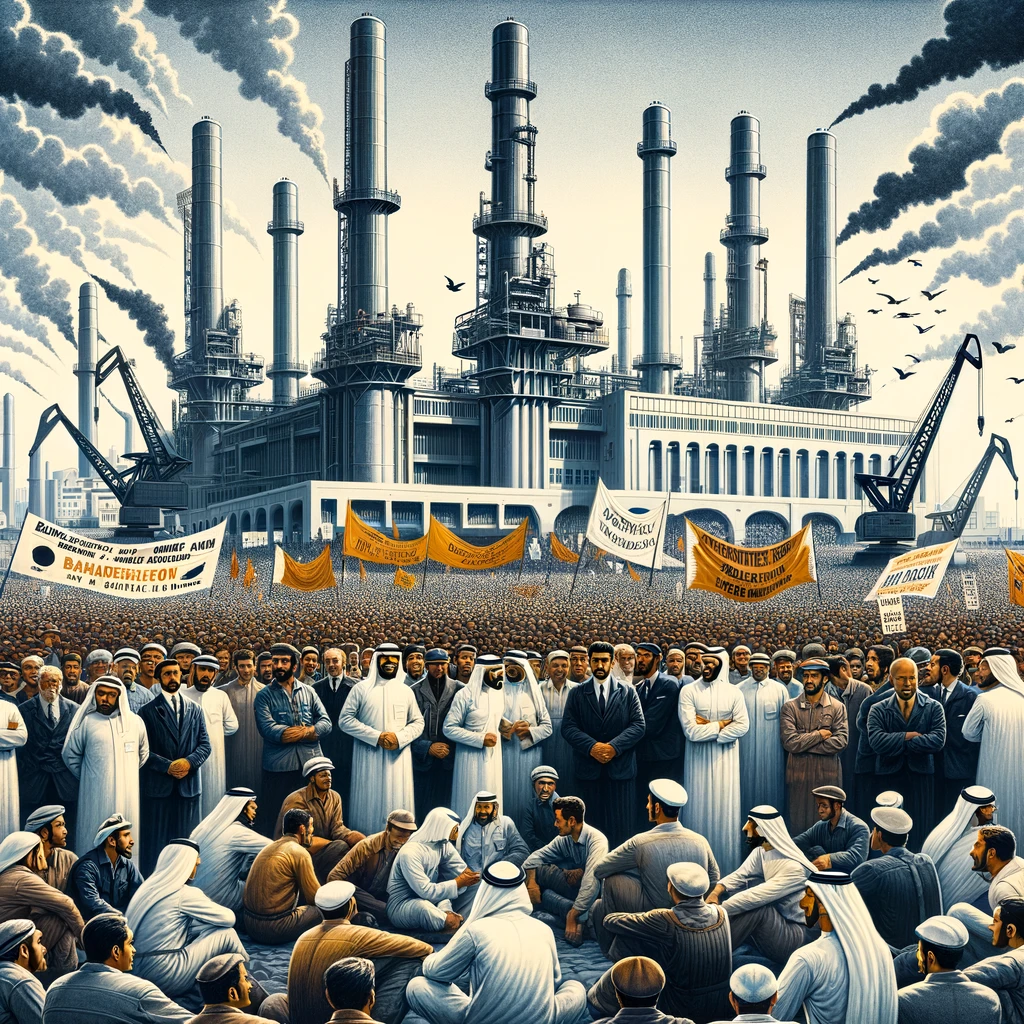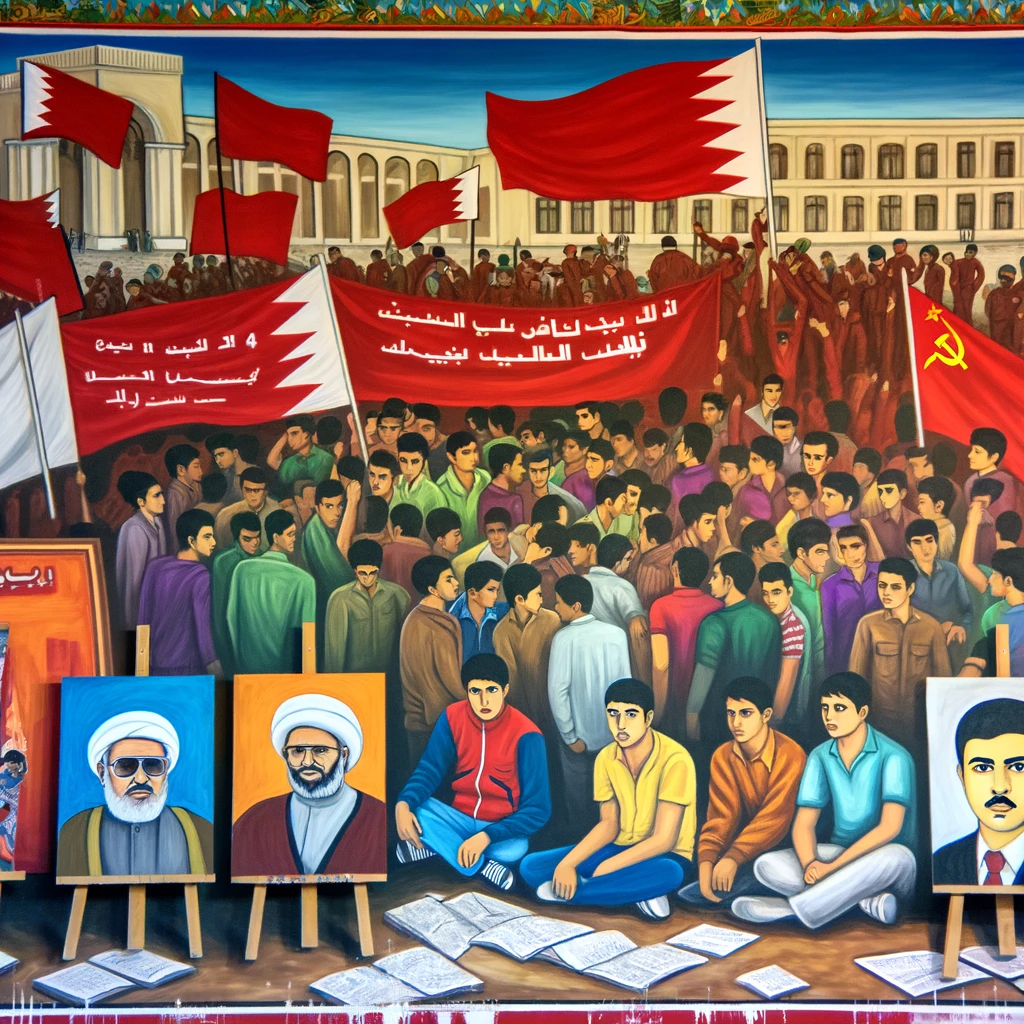In the annals of Bahrain’s rich history, the 1965 Workers Strike stands out as a defining moment of labor unrest that significantly influenced the course of labor rights and industrial relations in the small Gulf nation. Amidst the backdrop of burgeoning oil wealth and traditional industries in decline, the strike encapsulated the struggles of workers against the prevailing economic and political conditions of the time. This essay delves into the intricate details of this pivotal event, exploring the economic conditions, political climate, and the pivotal roles played by key figures and organizations, such as the Bahrain Petroleum Company (BAPCO), the General Committee of Bahrain Workers, and notable leaders like Abdulrahman al-Baker. Through an informative and descriptive lens, we aim to unravel the complexities of the Bahrain 1965 Workers Strike, adhering closely to historical facts and narratives that define this landmark episode in Bahraini history.
Economic Conditions
In the early 1960s, Bahrain’s economy was at a crossroads, marked by the juxtaposition of a booming oil industry and the decline of traditional pearling. The discovery of oil in the 1930s had gradually transformed the island’s economic landscape, positioning the Bahrain Petroleum Company (BAPCO) at the heart of this transformation. BAPCO, a subsidiary of the international oil conglomerate that significantly influenced Bahrain’s economy, became the largest employer in the country, attracting a workforce that was diverse in nationality and skill. Despite the prosperity that oil brought to some segments of Bahraini society, the pearling industry, once the backbone of Bahrain’s economy, faced an inevitable decline due to the global shift towards cultured pearls and the economic repercussions of the Great Depression.
Political Climate
The political climate of Bahrain during this period was significantly shaped by British colonial oversight, which had established a protectorate status over the island since the late 19th century. This colonial presence influenced Bahrain’s governance structures and its approach to labor and economic policies. Additionally, the rise of nationalist movements across the Arab world, inspired by the broader wave of decolonization after World War II, began to resonate within Bahrain. These movements advocated for national sovereignty, economic independence, and social reforms, including labor rights.
Labor Rights and Organization
The early 1950s witnessed the formation of Bahrain’s first labor unions, among them the General Committee of Bahrain Workers, which sought to represent the interests of the working class amidst the changing economic landscape. However, labor rights remained limited, with workers facing challenges such as low wages, poor working conditions, and a lack of legal protections. The labor movement in Bahrain was part of a larger regional trend where workers began to demand greater rights and better conditions, influenced by the global labor movement and the specific socio-political context of the Middle East.

Key Industries Affected
The oil industry, spearheaded by BAPCO, was the primary focus of labor unrest due to its significance in the economy and its impact on the workforce. The disparity between the wealth generated by this sector and the conditions experienced by its workers created a fertile ground for discontent. At the same time, the remnants of the pearling industry and other traditional sectors continued to struggle, further exacerbating the economic disparities within Bahraini society.
This historical backdrop sets the stage for understanding the complexities and dynamics that led to the Bahrain 1965 Workers Strike, highlighting the interplay between economic prosperity, political oversight, and the burgeoning demand for labor rights.
Worker Grievances
As the oil industry flourished, so too did the grievances among its workers. Key complaints centered around inadequate wages that failed to reflect the booming profitability of the sector, harsh working conditions that endangered health and safety, and a glaring absence of legal protections for labor rights. Workers at BAPCO, in particular, vocalized their dissatisfaction, highlighting the stark contrast between the company’s substantial revenue and their meager incomes. These grievances were not isolated to the oil sector; they mirrored a broader discontent among Bahrain’s working class, who saw little improvement in their living standards despite the country’s economic growth.
Role of Labor Unions and Political Groups
The buildup to the strike saw an increasing role of labor unions and political groups in organizing and advocating for workers’ rights. The Bahrain Trade Union Committee, under the leadership of figures such as Abdulrahman al-Baker, became a focal point for labor activism. Al-Baker, a staunch advocate for workers’ rights, played a pivotal role in mobilizing the workforce and demanding reforms. Alongside the Trade Union Committee, the National Liberation Front, a political group with leftist leanings, also supported the cause, providing a political framework for the economic grievances of the workers. These organizations were instrumental in unifying the diverse workforce, comprising both local and migrant workers, under a common cause for better wages, conditions, and rights.
Government and Employer Responses
The initial response from employers and the government to the rising tide of labor unrest was one of reluctance and, in many instances, outright denial of the legitimacy of workers’ demands. BAPCO, with its significant influence over Bahrain’s economy, was particularly resistant to making concessions. The company’s stance was mirrored by the government, which, under British influence and concerned about maintaining stability, viewed the growing labor movement with suspicion. Attempts at negotiation were few and often ineffective, leading to an escalation in tensions between the workforce and the powers that be. This period of pre-strike unrest set the stage for a significant confrontation, as workers increasingly saw direct action as the only viable means to achieve their demands.
This prelude to the strike illustrates the deep-rooted economic and social disparities that existed in Bahrain, exacerbated by rapid industrialization and the global dynamics of the oil market. The responses from the government and employers, marked by a lack of willingness to address workers’ concerns, reflect a broader theme of resistance to labor rights that was prevalent in many parts of the world during this era.
Chronology and Key Events
The Bahrain 1965 Workers Strike began in March, marking a significant escalation in the labor movement’s struggle for rights and better conditions. It was initiated by workers at BAPCO, who, driven by unresolved grievances, ceased work and organized demonstrations. The strike quickly spread beyond the oil industry, encompassing other sectors and drawing in a wide swath of the workforce across Bahrain. Key events included mass rallies in Manama, the capital city, where workers voiced their demands for higher wages, improved working conditions, and the establishment of lawful labor rights. These gatherings were not just demonstrations of discontent but also expressions of a growing class consciousness among Bahrain’s workers.
Participants
The strike saw a diverse participation from Bahrain’s working class, including both local Bahrainis and migrant workers from various sectors. The leadership of the strike was notably diverse, with figures like Abdulrahman al-Baker from the Bahrain Trade Union Committee at the forefront, embodying the collective aspirations of the workforce. The involvement of migrant workers highlighted the transnational nature of labor issues in the Gulf region, with the strike becoming a symbol of solidarity among workers of different nationalities and backgrounds.
Strategies and Tactics
Strikers employed a range of peaceful protest tactics, from sit-ins to mass rallies, aiming to garner public support and pressure employers and the government into negotiations. The strategic choice of non-violent protest was significant, reflecting a commitment to achieving goals through solidarity and collective action rather than through confrontation. However, the response from BAPCO and the government was markedly different, involving police intervention to disperse crowds and the imposition of martial law in an attempt to quell the unrest. These actions underscored the tensions between the state’s desire for control and the workers’ quest for rights.
Government and Employer Reactions
The government, with support from BAPCO and other affected employers, initially responded to the strike with a mix of dismissal and force, aiming to quickly suppress the movement and restore normalcy. This included the deployment of security forces to break up demonstrations and the arrest of strike leaders, which only served to heighten tensions. However, as the strike persisted and the economic impact became more apparent, there was a gradual shift towards negotiation. This phase of the strike was marked by a complex interplay of resistance and dialogue, with workers holding firm on their demands despite facing significant pressure from both the government and their employers.
Aftermath and Impact
Following the protracted struggle of the Bahrain 1965 uprising, which persisted in annual renewals until 1972, the Bahraini government initiated dialogue with the opposition. This pivotal engagement led to the announcement that three members of the workers’ committee would be integrated into government roles. Although the concessions made by the government, including wage increases and the release of all political prisoners, fell short of the opposition and unions’ broader demands, they represented significant progress towards addressing workers’ grievances.

The aftermath of the uprising left an indelible mark on Bahrain’s political and social landscape. Ian Henderson, known as the ‘Butcher of Bahrain’ for his notorious tenure overseeing security services, symbolized the harsh measures employed by the state to suppress dissent. Yet, the persistence of what became known as the “permanent intifada” forced the ruling al-Khalifa family and the colonial government to reckon with the formidable force of organized labor and nationalist sentiment.
The external support from the United Arab Republic and Iraq, alongside international advocacy and media attention, underscored the global dimensions of Bahrain’s struggle for justice and reform. The British government’s attempts to disclaim responsibility for the violence and extrajudicial killings during this period, citing Bahrain’s independence, did little to quell the criticism from human rights organizations and international observers. This global spotlight intensified the pressure on the Bahraini and British authorities, compelling a reevaluation of their approach to governance and internal security.
The saga of the March 1965 uprising and its enduring legacy highlights the transformative power of collective resistance. The demands articulated by the uprising’s leaders and the subsequent concessions by the government illustrate a significant albeit partial victory for Bahrain’s labor movement. The events catalyzed a gradual shift towards improved labor rights and set the stage for future activism, embedding a culture of resistance and advocacy for justice that would continue to influence Bahraini society and its governance.
The Bahrain 1965 uprising, culminating in a series of annual renewals and sustained demonstrations until 1972, represents a critical juncture in Bahrain’s history of labor rights and political activism. The eventual dialogue between the government and opposition, marked by partial concessions, symbolizes the complex interplay between the ruling authorities, colonial influences, and the burgeoning force of national liberation movements. This period of unrest not only catalyzed significant changes in labor policies and governance but also underscored the impact of international support and attention on domestic affairs. The legacy of this “permanent intifada” continues to resonate, serving as a testament to the enduring struggle for justice, rights, and sovereignty in Bahrain and beyond, reflecting the indomitable spirit of collective action and the persistent demand for meaningful reform.

